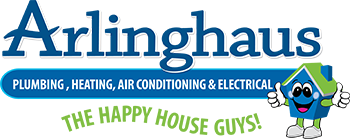People look at home improvements for two reasons. One, they either make your life easier or more comfortable. Two, they increase the property value of your home. Trying to find a balance between these oft-conflicting categories can turn decision-making into a hassle. Although the property value benefits of HVAC upgrades are sometimes hard to quantify, there are several ways you can increase your home’s HVAC efficiency while you make updates to the system to increase the value of your investment and make your family more comfortable at the same time.
HVAC and Home Value
The magazines are full of advice for increasing the return on your investment for any home improvement. However, it can be fairly difficult to measure how much you could expect to gain in a better property value. Caveats to this rule include replacing specific items, like doors or windows, and major upgrades like a complete kitchen overhaul. Remodeling Magazine publishes a Cost vs Value Report each year reflecting the percentage return on home improvements in increased property value, based on the average money spent and region of the country. Appliances are not included in this report, except for a backup power generator, which is an uncommon home accessory.
The lack of estimates of HVAC equipment’s effect on your home’s potential sale value does not stop real estate and HVAC experts from helping you to better qualify your personal financial benefit. Currently, buyers are quite selective about homes they will consider. The state of your HVAC equipment has the potential to make homeowners back away from bidding on your home, or rush to get in their offer before someone else does.
Replacing Old Equipment
Whenever you think about an upgrade for your home, you should balance your own wants and needs with an understanding of what future buyers may think of it. This is especially true if you plan to sell your home anytime in the next five years — for instance, you might need more space as your family grows. Whether you’re planning on staying in your home for a while but your system is outdated, or you’re planning to sell in the next couple of years, it makes sense to evaluate your HVAC system to determine if its condition will depreciate your home value in the long run.
Take a look at your HVAC system as if you had never seen it before. Ask the following questions:
- Is it clean?
- Is it functional?
- How does it compare to what buyers might get in a new home?
In theory, homeowners should not hold it against you if you have a home built in the 1980s or 1990s, with an HVAC system to match — it just makes sense with your home’s age. However, there are many ways to heat and cool a home, and they are not created equal — especially with modern technology. Being able to buy baseboard heaters or window air conditioners on the market today does not mean that they are as good as a central HVAC system with ductwork and vents. If your budget is minimal, start by replacing the items that are in poor repair, inefficient or visibly outdated.
Buying New Equipment
With excellent maintenance, The U.S. Department of Energy claims that you can expect a heat pump or air conditioner to last about 10 years, and a furnace about 15 years. Some appliances could last longer, but it is not practical to bank on it. For major HVAC purchases, you may choose to give yourself a few years with the new appliance, so you can enjoy the benefits of greater efficiency and comfort. That way, you can tell prospective homebuyers about the system being relatively new but established.
There are a couple of factors that should guide your decision-making. First, you must look at the system as a whole, even if you don’t intend to replace it all. Installing the highest-efficiency heat pump on the market means nothing when what homebuyers see on your wall is a manual thermostat with a simple dial. Second, remember that you are looking for not just function but relevance for the long-term. Ask your HVAC professional for advice about planned upgrades and phase-outs for HVAC equipment.
Major Upgrades to HVAC Systems
Making some major improvements for an efficient HVAC system can net a decent return on your investment, if you make the right selection and have a target homebuyer demographic in mind. There are basically two stages of equipment types that are appropriate for a major upgrade: current and niche. It would be an unfortunate mistake to replace your entire system with a system that is new but still considered old technology.
If you want to get current with what is built in new homes, you should look at central air and heating with ductwork to be the standard. Anything less will be considered less. This can be a tricky improvement to plan, because adding ductwork is expensive and simply does not work for some older homes. In those cases, you want the most current alternative. For example, instead of adding new window air conditioners, you would upgrade to a ductless mini-split.
The other option is to go for a niche market, such as solar or geothermal. Here, you are focusing less on what you might regain from your investment, by creating a greater interest in your home over the comps in your neighborhood. Geothermal heat pumps may be as much as 45 percent more efficient, which can save you (and the person who eventually buys your home) several hundred dollars a year on your heating and cooling costs. You can even get models that could replace your hot water heater. It makes your home look that much more appealing than the others on the market that have much less efficient systems.
HVAC Tax Deductions
There are many ways to increase your monetary benefit from HVAC upgrades, and increased efficiency is only one of them. Several tax credits, currently available for purchases of efficient sources of energy, could save you quite a bundle. Some people get intimidated about major HVAC purchases, because spending $10,000 or more on a new system is a lot of money. However, the federal government offers a 30 percent tax credit on certain renewable energy appliances, when purchased and installed by the end of 2016. This includes geothermal heat pumps, and there is no maximum amount you can claim. Since geothermal systems are believed to last longer than conventional technology, using the system for a few years yourself allows you to recoup your investment before you even consider the potential increased property value of your home.
Value of Maintenance
At the end of the day, you need to balance the way your HVAC system works and its appearance to others. This underscores the incredibly crucial role of HVAC maintenance in any home improvement plan. Maintenance calls for a little elbow grease on your end, and the willingness to hire a good HVAC technician to provide regular service and repairs as needed. With a good attitude about upkeep, your HVAC system will look good and run more smoothly, no matter how old it is.
If you want to make the best investment in your HVAC system, you should bank on upgrades that provide you with more efficiency and add to the overall property value of your home.


